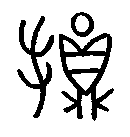I Ching, Yijing or Zhou Yi
"Oracle of the moon": © 2000 LiSe
 Yi Jing, Oracle of the Moon
Yi Jing, Oracle of the Moon

The image of hexagram 41
Sǔn, Diminishing
What does it mean, 'inner' and 'outer trigram' (popup)
Duì below Gèn: with Duì inside, you or the situation is social, you are open. But towards the outside there is holding back, staying aloof, because it is important to stay true to one's own values in the middle of others. That is possible by staying master over one's emotions - or by being indifferent to others, with a solid cover to protect your heart. Two sides, like every hexagram and every line has two sides. It is always a choice which side one takes, the positive or the negative one.

Ideogram of the hexagram name: At left a hand, maybe two hands, and at right a cauldron with a circle, meaning round or empty. In all ages, long before any arithmetic, the circle indicated already 'empty', hollow, nothing, zero. The hand is a special form, meaning to clasp one's hands and to bow with reverence. SUN: decrease; damage; harm; lose, be mean/shabby, be sarcastic/caustic.
But of course empty has two sides: the space where one can receive - or the lack of substance. This doesn't mean there is 'nothing'. It is which makes the book better than the movie.
Reading adds one's imagination, seeing the movie doesn't.
The cauldron is empty, but it is a sacred caudron, meant for sacrifices to the spirits. Even when you don't see what is inside, it still contains this sacred meaning. Every connection, with people, things, ideas, is based on this 'empty' depth. If not, they turn into prisons.
The 'Great Image' says: at the foot of the mountain is a lake: decrease. The noble one controls anger and restrains passion.
Hex.41 is the contrast of 31, which is about completing and embracing others.
Hex.41 is about the basics of oneself, your fundament, stripped from everything not-you.
Get rid of all conditioning and forms. You think you need them for being present in the world, for being visible, being you. But what they do is hide you. They hide your soul, your essence, your creativity, and they can even destroy all this.
If you dare to be your naked self, you will be amazed how great and rich it is. Diminishing is augmenting. Only an empty cauldron can receive others and blessings.
An empty mind is able to do anything. No form means no limits, no dogma means no restrictions. No future means eternity, no past means no guilt.
Let go in order to find.

